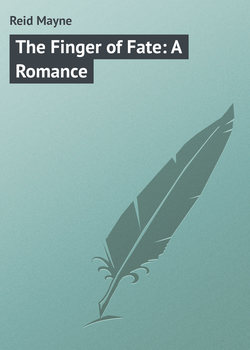Читать книгу The Finger of Fate: A Romance - Reid Mayne - Страница 14
Chapter Fourteen
Turned Artist
ОглавлениеA slight incident – the dropping of a pin, or the turning of a straw – may affect the whole current of a man’s life. There may be a fixed fate: but if so, it often seems to be brought about, or depend upon, circumstances purely accidental. Had Henry Harding not gone home by Holborn Bars; had he not got down at the corner of Little Queen Street; had he not taken a fancy for shell-fish; had he not that day done a hundred other things, all of which may have indirectly conducted to the encounter described; – his after life might have been as different from what is to be chronicled, as if it were that of some other man.
In a week from that time he might have been on his way to the West Indies, or some part of the great American continent, perhaps never to come back; whereas in a week from that time he was sitting in a studio, with a palette on his left thumb, a brush in his right hand, and an easel in front of him, while the classic blouse of brown holland and the embroidered smoking-cap told that he had turned artist.
The change in his life’s programme can be easily explained. The gentleman he had rescued from the garrotters had become his patron; and, listening to the counsels of the young Italian artist – for such was he – he had himself taken to painting as a means of procuring his livelihood. Nor was it such a despairing adventure. He had already displayed taste in his school-drawings, and was, moreover, gifted with that aptitude for the art that usually leads to success. Almost from the first day spent in the studio he was enabled to produce sketches that could be sold; and these were followed by those “furniture pictures” which have given not only practice but material support to many a struggling artist afterwards eminent in his profession, and who otherwise might never have been heard of.
The young Italian painter – Luigi Torreani by name – was himself but a beginner; but with that talent both of conception and execution, which distinguishes the countrymen of Titian, he was rapidly rising in his profession. He had got beyond the point of painting for mere bread, and was receiving a price for his pictures that promised something more than a subsistence.
It was upon the strength of his own success that he had given counsel to his new acquaintance. He had done so, after ascertaining something of the situation and prospects of the strong, gallant youth who had done him such an essential service. Henry at the time had told him but little of his antecedents. This was not needed to a mind generous as that of Luigi Torreani, and a heart at the same time touched with a sense of gratitude. On discovering the young Englishman’s project of self-banishment from his native land, he combated the idea with his counsel, and proposed, in the event of his abandoning it, to instruct him in his own art. In fine, his proposal was accepted, and Henry Harding adopted the profession of painter.
From acquaintances thus strangely introduced to each other, the two young men, not greatly differing in years, became fast friends, sharing apartments, table, studio together, and for many months the friendly association was continued. It was interrupted only by the advice of Luigi, who, deeply interested in the success of his brother artist, became desirous that the latter should spend some time in Rome, to perfect himself in his art by contemplating those classic forms so plentiful in the ancient metropolis of the world. For himself, the young Italian needed no such suggestive models. A Roman by birth, he had commenced his studies in their midst, and had ended by transferring his practice to that metropolis where the painting of them was sure to be best paid for. The education of his pupil, then, was to be the reverse of his own. The young English gentleman accepted the advice, less from any profound love of his art or ambition to excel in it, than from a longing, such as most youths feel, to look upon Italy. Italy! the classic land of our school-boy exercises! the land of bright skies and soft summer scenes! the land of Tasso, of Ariosto, Byron, Boccaccio, and the brigands! Who does not desire to behold such a country, classically poetical in its past, romantically picturesque in its present, and, it is hoped, to be free and prosperous in its future?
Henry Harding longed to look upon this land; and mingled with his longings was a hope he might there find Lethe, or at least some solace for his spirit, still suffering sorely from the cruel treatment he had received – from a double disappointment to his affection and his love. So long as he remained in England amid its souvenirs and scenes, these sad memories would ever remain fresh. Perhaps in a foreign land, with strange objects under his eye, strange voices sounding in his ear, he might be enabled to realise the truth of the oft-quoted adage, “Absence conquers love.”
